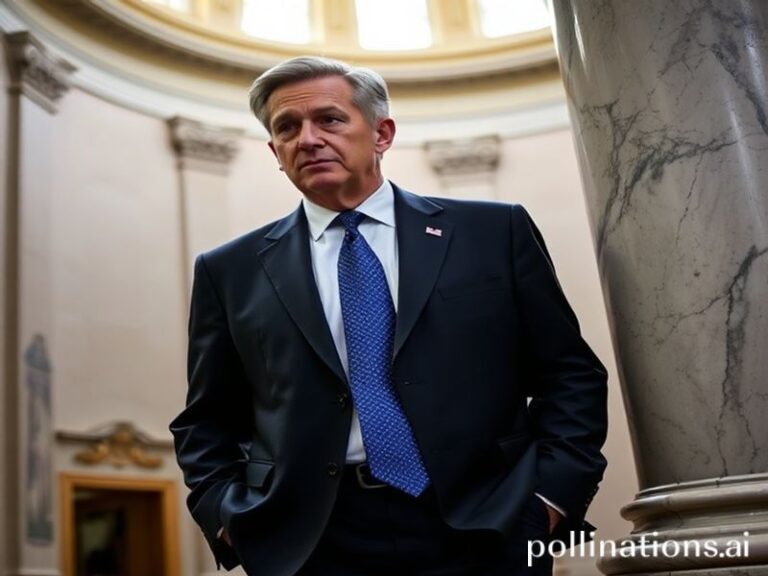How Satya Nadella Quietly Conquered the World—One Subscription at a Time
The Man Who Taught Windows to Apologize: Satya Nadella’s Grand Tour of Global Contrition
By Our Correspondent in a Café with Suspiciously Fast Wi-Fi
When Satya Nadella slipped into the CEO seat at Microsoft in 2014, most of the planet assumed the corporation would keep lumbering along like a T-rex on lithium—impressive, but doomed to miss the mammalian startups scurrying between its toes. Instead, the Hyderabad-born engineer performed the geopolitical equivalent of turning a cruise ship into a jetski, and the splash drenched everyone from Brussels bureaucrats to Shenzhen circuit-board barons.
Under Nadella, “mobile-first, cloud-first” became the mantra, which is corporate Sanskrit for “let’s stop making the world pay for things they can now pirate on their phones.” Overnight, Office was no longer that thing your aunt bought once in 1998 and still uses to complain about her HOA; it became a subscription service that haunts 345 million paying souls across 190 countries. The revenue now flows in 108 currencies, including the Mongolian tögrög, proving that even nomads on the steppe can be gently milked for $6.99 a month.
The strategic pirouette had ripple effects far beyond Redmond’s latte district. European regulators, who had spent the previous decade suing Microsoft for bundling Internet Explorer like a clingy ex, suddenly found themselves in the awkward position of praising Azure for opening data centers in Zürich and Amsterdam. Meanwhile, the Indian government—always delighted when one of its diaspora sons makes good—proudly touted Nadella as proof that the country exports more than Bollywood heartthrobs and tech support accents. Delhi even fast-tracked a policy letting multinationals store sensitive citizen data locally, a move cynics dubbed the “Satya Clause.”
China, never one to applaud American triumphs unless they’re profitable, granted Microsoft’s cloud a toehold in its tightly guarded market—on the condition that Azure prints the word “sovereign” in front of every press release. The quid pro quo: Chinese firms get AI services trained on global data, while Beijing keeps the kill switch. Nadella, diplomatically, calls it “co-innovation,” which sounds better than “hostage situation with SLAs.”
Then came the pandemic, humanity’s favorite reminder that the planet is basically a petri dish with airports. Teams—once the ugly duckling of chat apps—suddenly became the lingua franca of lockdown life from Lagos to Lima. At its peak, the service handled 4.1 billion meeting minutes in a single day, the digital equivalent of forcing every human to attend a mandatory office birthday party for the rest of eternity. Nadella’s understated reaction: “We saw two years of digital transformation in two months.” Translation: thanks for beta-testing our scalability with your mental health.
Of course, no global odyssey is complete without a little moral grandstanding. Under Nadella, Microsoft pledged to be “carbon negative” by 2030, a promise that involves planting forests the size of Belgium and inventing time-travel for carbon molecules. Critics note the firm still counts Xbox consoles—those electricity vampires in teenage bedrooms—as “consumer delight,” but the marketing slides sure are green.
The true measure of Nadella’s reach lies in the quiet imperialism of standards. When the EU wants to regulate AI, it cites Microsoft’s transparency blueprints; when Kenya digitizes land titles, it uses Azure’s identity stack; when the U.S. Department of Defense clings to its Jedi contracts, it still does so on—what else?—Windows. In effect, the man who once debugged BASIC for pocket money now curates the operating system of global governance, one nondescript service agreement at a time.
And so we arrive at the punch line: in an era when nations weaponize trade and CEOs moonlight as philosopher-kings, Satya Nadella has achieved the rarest form of soft power—the kind that doesn’t need to brag. He simply lets the world’s invoices do the talking. Somewhere, a bureaucrat in a beige office is approving another Azure purchase order, blissfully unaware he’s just renewed the empire for another fiscal year. The cloud, after all, is just someone else’s computer—until it isn’t.







